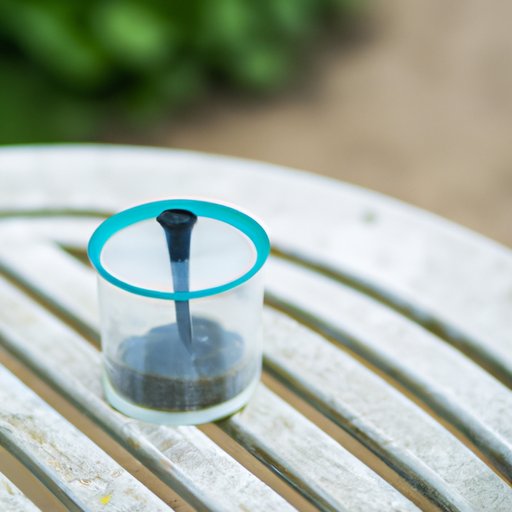
Introduction
Are you tired of constantly swatting pesky gnats in your home? These small insects can be a nuisance not only in your kitchen but also in other rooms in the house. Gnats reproduce quickly, and before you know it, you’re dealing with a full-blown infestation. If you’re wondering how to get rid of gnats in your house, this article is for you. We’ll explore different ways to eliminate gnats, including natural solutions, traps, and chemical insecticides.
Conduct a Comprehensive Inspection of Your Home
The first step in getting rid of gnats is identifying potential breeding areas. Gnats lay their eggs in damp soil, stagnant water, and organic matter. To locate these breeding sites, conduct a thorough inspection of your home. Check areas such as drains, garbage disposals, potted plants, and fruit baskets. Also, pay attention to the moisture levels in your home, especially in bathrooms, kitchens, and basements.
When checking for breeding sites, pay attention to the number of gnats in different areas. Knowing where they congregate the most will help identify their source.
Use Natural Remedies to Get Rid of Gnats
The benefit of using natural remedies to control gnats is that they are safe and non-toxic. Here are some remedies to consider:
Apple Cider Vinegar Trap
Apple cider vinegar is acidic, releasing a sweet smell that gnats can’t resist. Fill a jar with apple cider vinegar and add a few drops of dish soap. The dish soap helps to break the surface tension of the apple cider vinegar, causing gnats to sink and drown. Place the jar where you’ve identified gnats’ congregation or near their breeding site.
Coffee Grounds
Used coffee grounds also make an excellent gnat trap. Place used coffee grounds in a container and cover it with plastic wrap. Poke several holes in the plastic wrap. Gnats will be attracted to the scent of the coffee grounds and get trapped. Make sure to get rid of the container and used coffee grounds after two to three days.
Essential Oils
Some essential oils repel gnats. These oils include lemon, clove, and peppermint. Put a few drops of your preferred essential oil on cotton balls and place them around your home near breeding areas and where gnats congregate.
Use Traps to Capture Gnats
Traps are an excellent solution for controlling a gnat infestation. Here are some homemade and commercial traps to consider:
Vinegar or Wine Trap
Gnats are again attracted to vinegar, so a vinegar or wine trap is an excellent option. Fill a jar with vinegar or wine and add some fruit and dish soap. The fruit will attract gnats, while the dish soap will ensure they sink and drown. Make sure to keep the trap out of reach of children and pets.
Sticky Traps
Sticky traps are a simple and inexpensive way to catch gnats. These sticky tapes roll out and can be hung around places where gnats are likely to be found. They stick to anything that lands on them, making it difficult for gnats to fly away.
Electric Traps
Electric traps are an effective way of getting rid of gnats. They work by attracting gnats with ultraviolet light and then zapping them with electricity. Electric traps come in different sizes, and you can choose one that suits your needs.
Identify and Eliminate Gnats’ Food Sources
Gnats thrive on organic matter and moist environments, which are ideal breeding sites. To get rid of gnats, you’ll need to starve them by limiting their sources of food. Here are some tips:
Clean Up Food Waste
Ensure that you properly dispose of food waste by keeping it in sealed containers. Avoid leaving pet food or other organic waste uncovered, as this will attract gnats.
Minimize Standing Water
Standing water is a breeding site for gnats. Identify any potential areas where stagnant water might be present, such as flower vases, clogged drains, and saucers beneath potted plants. Regularly empty these areas or change the water.
Keep Your Home Clean and Tidy
Maintaining proper hygiene is crucial in controlling gnat populations. Regular cleaning and tidying of your home can go a long way in preventing gnats from thriving. Here are some tips:
Clean Surfaces
Ensure that you wipe surfaces in your home, particularly the kitchen, where food crumbs may be present. Gnats are attracted to organic matter, so cleaning surfaces and removing waste frequently will help reduce their attraction.
Remove Organic Waste
Be sure to remove organic waste from your home promptly. Vacuum upholstered furniture and carpets frequently to remove any crumbs or other food sources.
Use Chemical Insecticides Responsibly
Chemical insecticides should be a last resort when resolving a gnat infestation. If you opt for chemical insecticides, read the label carefully before use, and adhere to the instructions. Wear gloves and goggles to protect yourself during application.
Conclusion
Getting rid of gnats in your home may take some time and effort, but it’s worth it. The methods discussed in this article are effective in controlling gnat populations. Regular inspections, clean surroundings, and limited access to food and water sources can go a long way in preventing an infestation. Remember, natural remedies and traps are always the best option, keeping chemical insecticides as a last resort.





